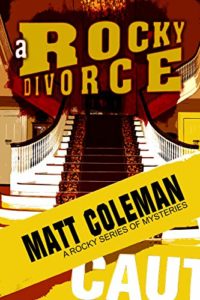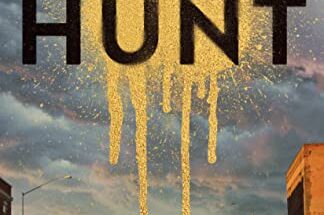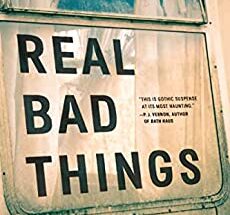 Matt Coleman’s, sharply crafted new detective novel, A Rocky Divorce, is my kind of mystery—funny with a dose of darkness and a killer plot that makes you smile even as you race to turn the pages.
Matt Coleman’s, sharply crafted new detective novel, A Rocky Divorce, is my kind of mystery—funny with a dose of darkness and a killer plot that makes you smile even as you race to turn the pages.
Life changes for Raquel “Rocky” Champagnolle, a day-drinking amateur sleuth with a keen eye for other people’s failings, when divorce leaves her with nothing. The pleasures of lounging on the couch in her parents’ house prove short-lived, and when her cousin Jen suggests she join the Junior League of Texarkana, Rocky is just desperate enough to agree.
Rocky finds a group of unlikely partners in the other Junior Leaguers—wealthy ladies who all seem to be blonde and named Brittany, and who amazingly go for Rocky’s idea to sell pot brownies for a worthy cause. But Rocky excels at more than creative fund-raising. She’s also a born sleuth, and her investigation of break-ins targeting these same ladies sends readers on an entertaining thrill ride that doesn’t let up.
A Rocky Divorce is Coleman’s third novel and the first in his new Raquel “Rocky” Champagnolle detective series. He describes his debut novel, Juggling Kittens (which has been optioned for a feature film), as dark Southern noir; his second, Graffiti Creek, as pure thriller; and A Rocky Divorce as his first novel that combines his two loves: mystery and comedy. And like the best comedic mysteries, A Rocky Divorce uses humor to reveal dark truths in a way that makes readers feel safe even as they venture into dangerous waters.
This darkly funny and delightfully twisty novel releases just in time for you to buy it as a holiday gift for the mystery lovers in your life. I was thrilled to chat with Matt about the inspiration for his irresistible sleuth, the challenges of writing funny mysteries, the charms of Texarkana, and so much more!
Emily Ross: I was ready to follow your main character, Rocky, anywhere from page one. She’s a girly girl who knows how to work a pretty dress and “never looked a gift flirt in the mouth.” She likes day drinking, lounging on the couch to Netflix and doesn’t suffer fools or bad fashion decisions. She’s also teacher and a gun toting amateur sleuth (that pink gun!) who can see through everyone’s bs with a laser sharp eye for the revealing details most of us miss. Can you talk about how you came up with this captivating, at times exasperating, and always believable main character?
Matt Coleman: I can! In fact, it’s my favorite subject to talk about. Because Rocky is based on my captivating, at times exasperating wife. My wife, Samantha, was talked into joining our local chapter of the Junior League a couple years back. She would come home with stories about her snarky comments. I was playing around one night and turned her stories into Rocky. I meant it as nothing more than something for her to read, but she loved it and wanted more. And more. And pretty soon it was a book I had written her for her birthday. I offered to keep it between us, but she pushed me to get it published. Needless to say, Rocky is my favorite character.
A Rocky Divorce touches on some dark topics including an eerie serial killer and an abusive father, but there are laughs on almost every page. And it’s more than one-liners that make it comedic. It’s an overall tone that rescues the darkest moments from becoming tragic. Walking that fine line between laughter and tears without mocking other people’s misfortune is hard to pull off and I’m impressed. Can you talk about some the challenges and rewards of writing a comedic mystery?
“Rescues the darkest moments from becoming tragic” is a fantastic way to put it. I love that and will likely steal it. What I am always trying to do is not necessarily make people laugh as much as give them an excuse to smile. Writing a crime novel is a dark place to live. The one common element of murder mysteries is that they involve murder. And death really shouldn’t be funny, but I do think my readers deserve a reprieve every now and then.
I’ve written sketch comedy where you navigate from joke to joke. Writing a comedic novel is very different. It’s more about putting your characters in humorous situations. And also coming up with characters who just make us want to smile. I think Rocky is one of those characters. So the more you can have that character on the page, the more rewarding it is to me as a writer. Things are just brighter with a character like her in a scene.
And writing comedy also gives me permission to be quirky and weird and have fun with things like character names (something I really enjoyed in this book). The biggest challenge, to me, is that I’m not sure all readers take us seriously as comedic writers. Just like with movies, writing comedy seems to put you in sort of a lower tier of storytelling. Which I find ridiculous. We, as comedy writers, are still exploring emotions and important issues. I’ve written comedy and I’ve written straight fiction. Comedy is harder. Hands down.
As a follow-up question, there aren’t that many truly comedic mysteries out there but I love them and wish there were more. Can you share some of your favorites?
Of course! One of the best out there is Kellye Garrett. Her Hollywood Homicide and Hollywood Ending (the Detective By Day books) are some of the funniest mysteries you will find. If your humor runs darker, then I would point you toward #FashionVictim, by Amina Akhtar. It’s super dark. Both twisty and twisted, but it’s very funny. A couple of writers I love who might not jump out as comedic are E.A. Aymar and Angel Louis Colón. Neither writes what I would call obvious humor, but they both have genius comedic timing. If you read Aymar’s The Unrepentant or Colón’s Hell Chose Me, you’ll find the epitome of writers who rescue the darkest moments from becoming tragic (told you I’d steal it).
I hope I can say this without spoiling things—I absolutely loved the Rye mother cold case that’s threaded throughout book like a creepy fairy tale. Those blue cornflowers—wow. Can you share how you came up with this aspect of the novel, without spoilers of course?
The Rye Mother actually wasn’t in the first draft of this book, and I can’t discuss why I added the story without spoiling things, but I sort of fell in love with the tale. Enough that I feel like I can safely say we haven’t heard the last of the Rye Mother. The story came from the German folk tale of the Roggenmutter (rye mother). I stumbled across it going down a rabbit hole online reading creepy folk tales from different countries. Basically, the story is about a being who steals children who are picking cornflowers. I followed the logic that a reporter could have stumbled across the same story, and then he simply used it when attempting to come up with a headline-worthy name for a local serial killer.
Here’s a process question our readers love. Are you a plotter or a pantser? Did you outline or use other methods to write this tightly plotted mystery that kept me guessing right up to the end?
I’m a plotter. I was a pantser with my first book, Juggling Kittens. And while I still love that book, I always had some issues with the plot. So with my second book, Graffiti Creek, I tried to outline everything chapter by chapter. I learned a lot about plotting with that book. So what I do now is write out the major plot points I want to hit in every chapter before I even start writing. Things may change some, but I at least have an idea of the major plot points and about when I need to get to them.
Another process question. What was the biggest or most painful change you had to make to this novel on the way to publication?
My first reader is always my wife. And my wife is the basis for Rocky. So she figures shit out faster than normal people. I had to make a very large and painful change (which I can’t talk about because it would spoil the whole book) because she figured out the whole mystery way, way, way too quickly the first time through. She isn’t a fair judge, but it still needed to change.
I knew nothing about Texarkana before I read this novel. I found the wealthy ladies in the Junior League deliciously annoying and had no idea patchouli and tie-dye were alive and well in the South. But it’s not all wealthy elite either. Can you talk about why you set your novel here?
Texarkana is my home town, and it is a very interesting place. We are a border town. Half of the town is in Arkansas (where I live), and the other half is in Texas. We have some relative wealth (mainly because the cost of living is so low) and a lot of poverty. Some racial tension. We’ve got one of America’s oldest unsolved serial killers (the Phantom Killer … Google it … amazing). We have one of the most well-known Bigfoot legends (Fouke Monster … also, Google). There’s a lot going on, and nothing going on. I think when I was younger, I wanted to write my way out of my hometown, so to speak. But at some point I realized that no one else is writing mysteries set in Texarkana. So I can be the one. I think I’m the one.
Rocky casts a cold eye on the ladies of the Junior League, but gets uncomfortable when she starts to see herself in them. I love it in mysteries when the sleuth doesn’t just solve the crime but learns something about herself and that’s certainly true of Rocky. Can you discuss aspects of the crime in the novel that push Rocky toward some self-realization?
Rocky has a huge heart. She may not like to wear it on her sleeve, but when the Junior League starts projects that touch on Rocky’s heart for kids in need she starts to see a different side of everything. I think that’s the biggest aspect of the book that makes her really evaluate herself. She begins to see herself in some of these women she has tried so hard to hate. There is a theory that the things that annoy us the most are things we, ourselves, are guilty of. Rocky comes to terms with that on some level. She is the master of picking out a nemesis who, in many ways, is a version of herself.
A Rocky Divorce is the first in a new series and I can’t wait to read more. Can you give us a sneak peek of what’s next for Rocky?
There will definitely be more Rocky. Even if I’m just writing about her for my own amusement. I love this character and this world too much to leave it any time soon. My current plan is to write some Rocky shorts as I chip away at a second Rocky novel. In the very short term, Rocky lives in the same fictional universe as the characters from my first novel, Juggling Kittens. Some of the characters from this book show up in a short story featuring the main character from Juggling Kittens that is currently in Ellery Queen Mystery Magazine. I really want to put Rocky’s skills up to some classic mystery challenges. I want her to have a locked room and an impossible crime. A perfect murder. A cold case. I want to see what Rocky will do with some of those cases. And, since it’s comedy, I can also put her in all the fun situations which a smarter and more serious writer might work to avoid. For example, the early plotting of book two has Rocky going to a psychiatric hospital. Because I can.
About Matt Coleman: Matt is a writer of mystery and comedy. A Rocky Divorce is his third novel. His debut, Juggling Kittens, was recently optioned for a feature film. His second book, Graffiti Creek, was not. Matt’s comedic writings have included Raptured: A Sex Farce At the End of the World, co-written with Matt Lyle, and a three-year stint writing for the comedy podcast, The City Life Supplement. Shorter fiction can be found between the pages of Ellery Queen Mystery Magazine, online at Shotgun Honey, or at Book Riot, where Matt is a regular contributor. He is the father of two girls, who are growing up too fast. Matt lives in Texarkana, Arkansas, with a beautiful wife who is way out of his league.




1 comment